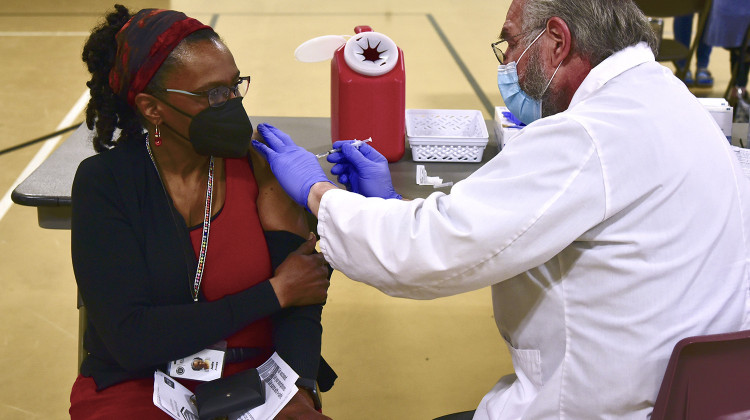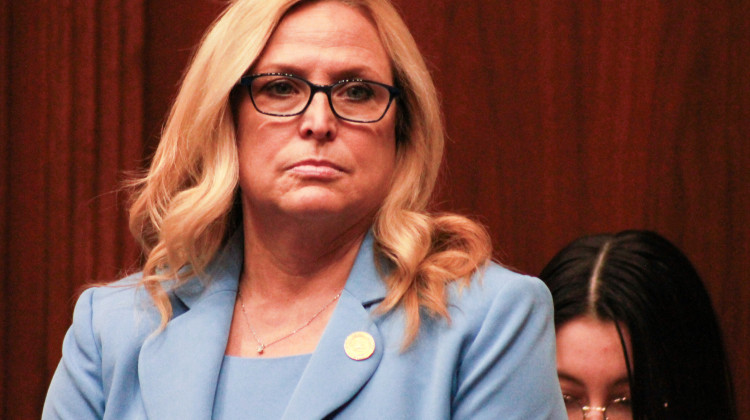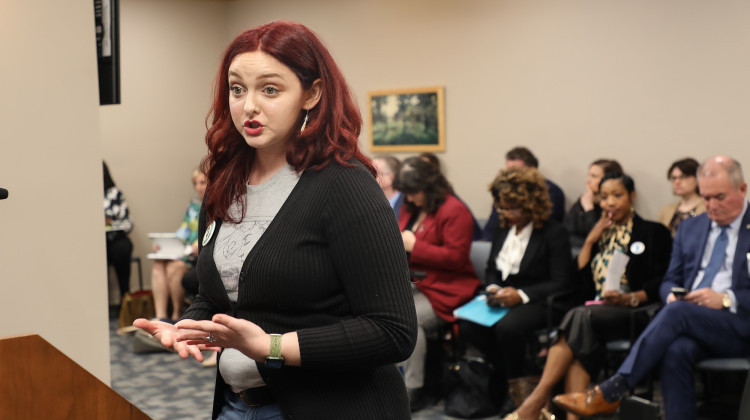The Indiana Department of Health reported 67 additional confirmed deaths over the last week. That brings the state’s total to 13,203 confirmed deaths. The state also reported more than 3,500 new cases in the last week – the fewest reported in a single week since July 2020.
Indiana has administered 2,647,965 initial vaccine doses, with 2,512,956 Hoosiers fully vaccinated.
Here are your statewide COVID-19 headlines from last week.
Holcomb Sets End Date For COVID-19 Public Health Emergency
Gov. Eric Holcomb is ending the majority of remaining COVID-19 restrictions Tuesday and all state executive orders issued during the pandemic will be repealed at the end of June.
Holcomb announced one last extension of the public health emergency Friday. That extension ensures Indiana will continue to receive federal funds for programs that include welfare benefits and food stamps.
READ MORE: How Is Indiana Distributing COVID-19 Vaccines? Here's What You Need To Know
Join the conversation and sign up for the Indiana Two-Way. Text "Indiana" to 73224. Your comments and questions in response to our weekly text help us find the answers you need on COVID-19 and other statewide issues.
The governor's latest order also waives any penalties or interest payments Hoosiers accrued on the state income taxes they owe for unemployment benefits received last year.
Holcomb said, if necessary after June, he will issue a new executive order that’s limited to the state’s vaccination program and financial assistance for health and welfare programs.
Indiana House Lawmakers Ask Governor To Stop IU's COVID-19 Vaccine Mandate
Nineteen Indiana House lawmakers – led by Rep. Jim Lucas (R-Seymour) – want the governor to stop Indiana University from mandating students, faculty and staff receive the COVID-19 vaccine.
The group of GOP lawmakers sent a letter to Gov. Eric Holcomb Tuesday. In it, they say students will drop classes, be ostracized from campus and employees will be fired if IU is allowed to mandate the vaccine.
The House lawmakers want Holcomb to use his executive power to stop IU from mandating the vaccine. Many of those same lawmakers have decried the governor’s use of executive authority throughout the pandemic.
AG Rokita: Indiana University COVID-19 Vaccine Policy Violates State Law
Indiana Attorney General Todd Rokita thinks an Indiana University policy that asks for proof of COVID-19 vaccination violates a new state law.
Rokita issued an advisory opinion on the issue Wednesday, prompted by requests from Republican lawmakers who oppose the university policy.
The new law, HB 1405, bans state and local governments from creating or requiring COVID vaccine passports. Legislative leaders and the bill’s authors and sponsors said that language didn’t mean K-12 schools or public universities.
Opposition From Republican Officials Grows Against IU COVID-19 Vaccine Mandate
Pressure is building on Indiana University to repeal its requirement that students, faculty and staff receive a COVID-19 vaccination.
The vast majority of the Indiana Senate Republican Caucus sent a letter to IU Thursday, expressing “grave concerns” over what they call its “heavy-handed mandate.”
The GOP legislators’ letter said IU’s policy would force students – which the lawmakers call the “lowest at-risk demographic” – to make a decision based on economics rather than health and individual responsibility.
At the same time, prominent conservative attorney Jim Bopp has filed a public records request with the university. Bopp, acting on behalf of a group called “IU Family For Choice, Not Mandates” wants documents related to how and why the university created its COVID-19 vaccination mandate.
IU Believes In The Legality Of Its COVID-19 Vaccine Requirement
Indiana University officials remain confident in the legality of its vaccine requirement for all students, faculty and staff this fall, despite growing opposition from Indiana lawmakers.
Several GOP legislators and Indiana Attorney General Todd Rokita believe a new state law does not allow the University to make individuals show proof of vaccinations.
"There is no question about the legality of requiring the vaccine," said IU spokesperson Chuck Carney.
The new law, HB 1405, bans state and local governments from creating or requiring COVID vaccine passports, but other legislative leaders have said previously that language didn’t mean K-12 schools or public universities.
Purdue University Named In AG’s Advisory Opinion On Vaccine Document Requirements
As Indiana colleges and universities weigh requiring vaccines on their campuses this fall, Attorney General Todd Rokita released an advisory opinion on the policies implemented at Indiana University and Purdue University.
The opinion does not carry the force of law but noted that IU’s policy requiring vaccine documentation violates state law, while Purdue’s policy – which merely encourages the school community to get vaccinated and submit proof – does not.
Rep. Chris Campbell (D-West Lafayette), who co-authored the original bill, said in a statement she disagrees with Rokita’s interpretation and even spoke with Purdue officials when the language around immunization passports was added.
“They responded that they were comfortable with the language as drafted and did not feel that the language would prohibit a requirement of proof of vaccine,” Campbell said. “If the authors of this legislation wanted to prohibit our colleges and universities from requiring a vaccine passport, they should have specified that within the bill.”
Colleges and universities have been weighing whether to require vaccines for a while now.
All IN: COVID-19 Recovery In The Hispanic Community
¿Qué Pasa, Midwest?, a bilingual podcast for Indiana’s Hispanic community based out of WNIN, focused its latest season on the theme of recovery from COVID-19.
All IN talks to two people behind the podcast about what they’ve learned. And they also hear from some of the people featured in the season, including a home visit nurse and a professor whose students helped translate crucial vaccine forms.
State Initiative Offers 50,000 Summer Child Care Scholarships For Essential Workers
Federal COVID-19 relief funding is providing K-12 schools with an influx of critically-needed cash, but millions of dollars are also providing support for early childhood education. Part of the funding will go toward a child care scholarship program for essential workers in the state.
The pandemic caused major disruptions for working families, with many withdrawing their children from child care as they stayed home.
But Maureen Weber, president and CEO of Early Learning Indiana, said federal funds are helping stabilize the industry as people go back to work in person.
That includes a state-run scholarship program, providing scholarships to help cover costs of child care, summer learning, and before or after school programs for the children of essential workers in Indiana.
Early ILEARN Results Show Expected Drop In Scores, Significant Declines In Math
Early standardized testing results show a drop in student test scores – particularly in math – but the Indiana Department of Education is reassuring families and educators the decrease was expected.
Last year, assessments were canceled because of the pandemic, and disruptions continued into this school year, which prompted many officials to expect a decline in student scores.
According to an update from IDOE, early results being shared with schools and parents confirm the expected decline. Results show a drop in English language arts and a more significant decline in math. The department says 97 percent of students participated.
Democrats Renew Calls For Higher Minimum Wage Amid Hiring Woes
Indiana Senate Democrats are renewing their calls for increasing the state’s minimum wage as typically lower-wage businesses like restaurants say they can’t hire enough workers.
Democrats have tried passing measures, including a few during the legislative session this year, to gradually increase the state’s minimum wage to $15 an hour. In every attempt, most Republicans have blocked their efforts.
Now Democrats are echoing economists in saying that low-wage jobs – not necessarily unemployment benefits – are causing workers to stay at home.
All IN: Opening Back Up
The number of vaccinated Hoosiers is going up. But how close are we to reaching herd immunity? All IN talks to a public health expert to find out.
They also hear from experts in tourism and business economics to find out if businesses and large conventions plan on opening to the public. And if they do, how safe can it be?
Indiana's April Unemployment Numbers Show Little Change From March
Indiana’s unemployment rate is 3.9 percent for April, remaining unchanged from the month before. The data is preliminary, but may show a slight slowing in economic recovery from the ongoing pandemic.
Not only did the unemployment rate pause from a steady decline, the number of people saying they’re able to work stayed mostly unchanged, too. That’s as employment slipped and the raw number of unemployed Hoosiers increased for the first time in a year, although both only slightly.
Areas like Elkhart – where the RV industry is undergoing a major boom in production – have local unemployment rates even lower than state. But other areas like Kokomo, Gary and Michigan City remain several percentage points higher.
Contact Lauren at lchapman@wfyi.org or follow her on Twitter at @laurenechapman_.
 DONATE
DONATE







 Support WFYI. We can't do it without you.
Support WFYI. We can't do it without you.